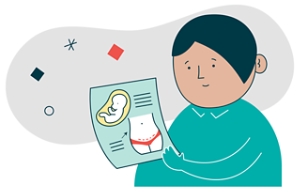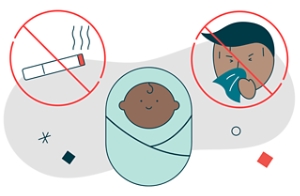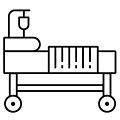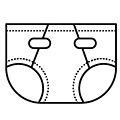Week 38 of Your Pregnancy: Care Instructions
Believe it or not, your baby is almost here. You may notice how your baby responds to sounds, warmth, cold,
and light. You may even know what kind of music your baby likes.
|

Even if you expect a vaginal birth, it's a good idea to learn about cesarean section (C-section).
C-section is the delivery of a baby through a cut (incision) in your belly. It's a major surgery, so
it has more risks than a vaginal birth.
|

During the first 2 weeks after the birth, limit visitors. Don't allow visitors who have colds or
infections. Ask visitors to wash their hands before they touch your baby. And never let anyone smoke
around your baby.
|
|

|
Know about unplanned C-sections. Reasons for an unplanned C-section
include labor that slows or stops, signs of distress in your baby, and high blood pressure or other
problems for you.
|
|

|
Know about planned C-sections. If your baby isn't in a head-down
position for delivery (breech position), your doctor may plan a C-section. Or you may have a planned
C-section if you're having twins or more.
|
|

|
Get as much help as you can while you're in the hospital. You can
learn about feeding, diapering, and bathing your baby.
|
|

|
Talk to your doctor or midwife about how to care for the umbilical cord
stump. If your baby will be circumcised, also ask about how to care for that.
|
|

|
Ask friends or family for help, as you need it. If you can, have
another adult in your home for at least 2 or 3 days after the birth.
|
|

|
Try to nap when your baby naps. This may be your best chance to get
some sleep.
|
|

|
Watch for changes in your mental health. For the first 1 to 2 weeks
after birth, it's common to cry or feel sad or irritable. If these feelings last for more than 2
weeks, you may have postpartum depression. Ask your doctor for help. Postpartum depression can be
treated.
|
Follow-up care is a key part of your treatment and safety. Be sure to make and go to all
appointments, and call your doctor if you are having problems. It's also a good idea to know your test results
and keep a list of the medicines you take.
Current as of: July 10, 2023
Content Version: 14.0
Care instructions adapted under license by your
healthcare professional. If you have questions about a medical condition or this instruction, always ask
your healthcare professional. Healthwise, Incorporated disclaims any warranty or liability for your use of
this information.
© 2006-2024 Healthwise, Incorporated.